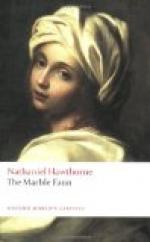“O, most gladly, signorina!” exclaimed Donatello. “See; it shall be like this.”
And forthwith he began to dance, and flit about the studio, like an incarnate sprite of jollity, pausing at last on the extremity of one toe, as if that were the only portion of himself whereby his frisky nature could come in contact with the earth. The effect in that shadowy chamber, whence the artist had so carefully excluded the sunshine, was as enlivening as if one bright ray had contrived to shimmer in and frolic around the walls, and finally rest just in the centre of the floor.
“That was admirable!” said Miriam, with an approving smile. “If I can catch you on my canvas, it will be a glorious picture; only I am afraid you will dance out of it, by the very truth of the representation, just when I shall have given it the last touch. We will try it one of these days. And now, to reward you for that jolly exhibition, you shall see what has been shown to no one else.”
She went to her easel, on which was placed a picture with its back turned towards the spectator. Reversing the position, there appeared the portrait of a beautiful woman, such as one sees only two or three, if even so many times, in all a lifetime; so beautiful, that she seemed to get into your consciousness and memory, and could never afterwards be shut out, but haunted your dreams, for pleasure or for pain; holding your inner realm as a conquered territory, though without deigning to make herself at home there.
She was very youthful, and had what was usually thought to be a Jewish aspect; a complexion in which there was no roseate bloom, yet neither was it pale; dark eyes, into which you might look as deeply as your glance would go, and still be conscious of a depth that you had not sounded, though it lay open to the day. She had black, abundant hair, with none of the vulgar glossiness of other women’s sable locks; if she were really of Jewish blood, then this was Jewish hair, and a dark glory such as crowns no Christian maiden’s head. Gazing at this portrait, you saw what Rachel might have been, when Jacob deemed her worth the wooing seven years, and seven more; or perchance she might ripen to be what Judith was, when she vanquished Holofernes with her beauty, and slew him for too much adoring it.
Miriam watched Donatello’s contemplation of the picture, and seeing his simple rapture, a smile of pleasure brightened on her face, mixed with a little scorn; at least, her lips curled, and her eyes gleamed, as if she disdained either his admiration or her own enjoyment of it.
“Then you like the picture, Donatello?” she asked.
“O, beyond what I can tell!” he answered. “So beautiful!—so beautiful!”
“And do you recognize the likeness?”
“Signorina,” exclaimed Donatello, turning from the picture to the artist, in astonishment that she should ask the question, “the resemblance is as little to be mistaken as if you had bent over the smooth surface of a fountain, and possessed the witchcraft to call forth the image that you made there! It is yourself!”




